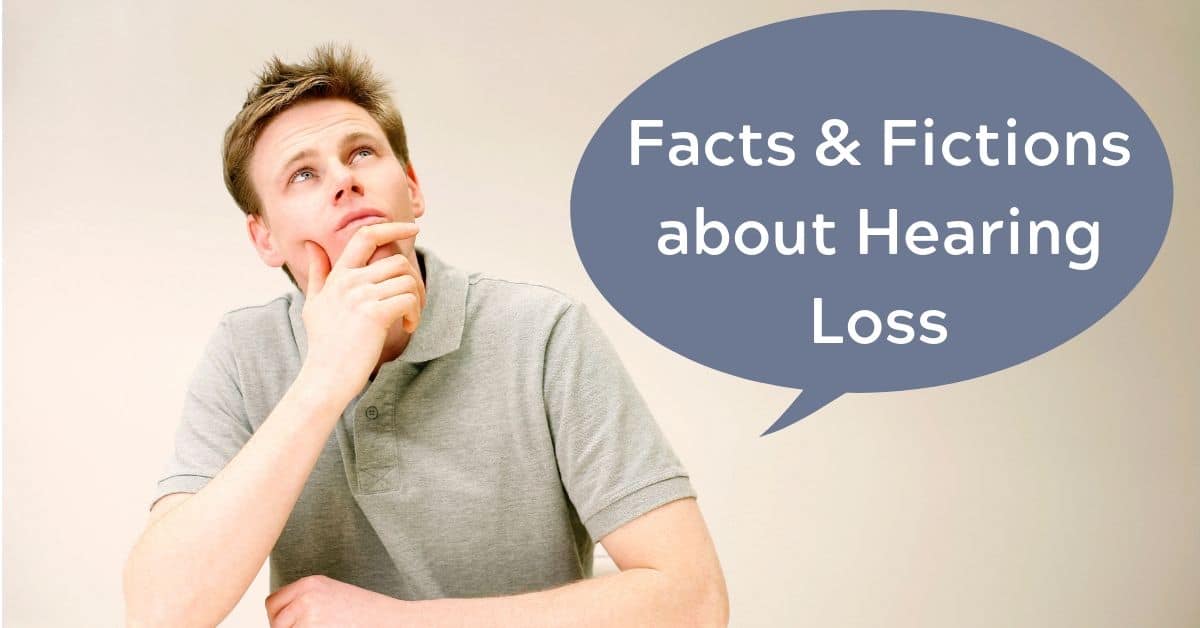
Myths about hearing loss are prevalent and need to be debunked. Hearing loss has become the fastest growing health concern in the US. When we think of our hearing, we don’t seem to incorporate it into our overall health program as one would when it comes to the health of our heart or eyesight or blood pressure. In order to encourage you to invest in your hearing health, the following article will provide information in contrast to some common misconceptions the general public has.
Fiction: Hearing loss doesn’t affect your health.
Fact: Nothing could be farther from the truth. It is firmly established by medical research that there is a direct link between hearing loss and cognitive decline. It has also been proposed the earlier hearing loss is treated the better the performance of our memory as we age.
The loss of hearing often results in a negative impact on our social and professional lives.
Many people start to withdraw from social interactions and recreational activities as the ability to communicate becomes tedious and restrictive. This leaves many people feeling isolated and more vulnerable to feelings of depression.
Hearing loss may also lead to fatigue, as people with hearing loss constantly ask people to repeat what they have said or to try and fill the spaces of unheard speech. Sounds that are easy to decipher become distorted and conversation can sound muffled. Consistent strain from staying engaged in conversation is discouraging and takes a physical and mental toll.
Fiction: Hearing loss doesn’t affect a lot of people.
Fact: Worldwide, the statistics show that that is overwhelmingly untrue. As stated by the World Health Organization (WHO), there 34 million children that have debilitating hearing loss when added with the number of adults, the total comes to almost 500 million people across the globe.
In reality, hearing loss is the fastest growing health concern in the US, along with diabetes and cancer. Additionally, based on records of standardized hearing examinations published by the Centers for Disease Control (CDC), there are approximately 30 million Americans over the age of 11 that suffer hearing loss in both ears. in addition, the CDC has estimated that “by 2050 over 900 million people will have disabling hearing loss.” Coupled with the unseen nature of the hearing loss, and a lack of public awareness, hearing loss is becoming a prevalent health issue for the public.
Fiction: Only older people suffer hearing loss.
Fact: Once again statistics dispel this myth. Data from the CDC shows that “1.1 billion young people (aged between 12–35 years) are at risk of hearing loss due to exposure to noise in recreational settings.” In further studies conducted by the CDC, it was found that hearing loss occurring during childhood was preventable in 60% of the cases. Yes, hearing loss does occur at a faster rate the older we get but currently, almost 50 million Americans with hearing loss are under the age of 60. To round it off, the CDC has also found that an average of 38 million aged 18 and over have reported hearing afflictions.
Fiction: Everyone that has hearing loss uses hearing aids.
Fact: Unfortunately, we usually attend to our hearing loss when the damage has already incurred. There are close to 30 million Americans that do not have hearing aids but would greatly benefit from their use. It is also the nature of hearing loss to be slow and gradual and in this case, people automatically start to compensate until permanent damage is manifested.
It usually begins with minor changes such as increasing the volume of the TV, asking people to repeat themselves or staying away from loud environments in social situations.
It is also known that people wait five years or more after they acknowledge their hearing is on the decline before they seek proper testing and treatments from hearing health professionals. This is quite unfortunate because early detection is key to retaining a full and rich experience for the duration of your life!
Ascent Audiology and Hearing
At Ascent Audiology and Hearing, we encourage and invite you to empower yourself and the health of your hearing starting today. Invest in and strengthen your hearing health by setting an appointment for yourself or a loved one. If you have any questions or concerns, we are here to support you on your journey to a fuller and richer hearing experience.
